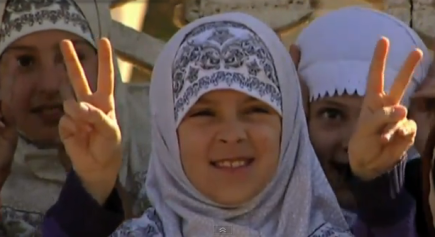Let me preface this post by saying that I know that writing that the crisis in Japan could be a way, ironically, to boost our own personal feelings of gratitude or happiness risks seeming insensitive, or worse, just callous. I would rather that we all feel grateful for other reasons, and I feel deeply sad about what is happening.
My kids feel sad and worried, too. This post is about how I’ve helped them make sense of it all, how I’ve helped them balance out the negative emotions that they are feeling with positive ones. What they learn will help them be resilient—rather than overwhelmed, or just plain petrified—in the face of other disasters.
 “What we do at the individual level really does affect the global environment.”
© from Tom Shadyac’s new documentary, “I Am.”
“What we do at the individual level really does affect the global environment.”
© from Tom Shadyac’s new documentary, “I Am.”
The easiest thing to do, I realize, is not to do anything at all. Just tell ourselves that our children are too young to understand—to turn off the television, turn over the newspaper, deny that something horrific is happening outside the cozy walls of our not-affected homes.
But when we ignore or deny another person’s pain (or another country’s), we miss an opportunity to feel good. Yes, you read that right: Compassion is a complex positive emotion, and when we feel it, our well-being often improves.
When we witness suffering and compassion, our vagus nerve fires. While this might sound scary, an active vagus nerve is actually a quick ticket to well-being. When our vagus nerve is activated, we feel calm. Our heart rate slows, and our immune system is enhanced. That’s something to think about: Sharing another person’s suffering can even make us healthier.
So my best advice in the face of the crisis in Japan is not to shield your kids from the suffering of others, in order that they might feel compassion.
And then, without delay, mobilize. We feel better when we act to help others. Kids can develop a much healthier response to suffering if they’re given a constructive way to act on their feelings of compassion; otherwise, they might feel panicky and helpless. Just because this particular crisis is half a world away does not mean that we are powerless to help. My children are doing two things in particular to aid people in Japan.
First, they are raising money. We are hosting a pizza-and-movie party, and charging our guests to attend. All proceeds go to help provide food and shelter to Japanese families who are now homeless. And the whole party—from planning to clean up to making the actual donation—is being handled, with my support, by my 8 and 10 year old.
Second, they are sending their loving thoughts to children abroad. At their school, a room has been set up for kids to make origami cranes as a way to express their compassion and concern. At home, we light a candle at dinnertime on behalf of all those who need our compassion. We hope for food and supplies and shelter, for the success of rescue and relief efforts. We know from studies of loving-kindness meditation that sending good thoughts and well-wishes to those who need it can make us feel more connected and secure.
There are other reasons that cultivating compassion in the face of a tragedy makes us feel good. Compassion often leads us to three other very potent positive experiences:
1. Gratitude. As we feel for tsunami victims huddling up on the hard floors of refugee centers, it’s OK—maybe even inevitable—that we also feel a sense of gratitude for our own warm bed.
2. Inspiration. Watching my children brainstorm ways that they can help tsunami victims fills my heart, and inspires me to find other ways to help as well.
3. A Helper’s High. In the movie “I AM,” a documentary (featuring Greater Good’s own Dacher Keltner) about ways that we can improve the ills that plague our world, one of the experts talks about how helping others often leads directly to feelings of being uplifted or elevated. Other researchers have described a similar phenomenon that they call “helper’s high”—positive feelings that can border on elation. Others suffer, we feel compassion, and we are moved to help. When we do help, we often experience powerful positive feelings.
Inspiration. Elevation. Gratitude. Love. Compassion. These emotions, to me, are all particular forms of happiness; they are the very foundation of a happy life. And I believe that those of us who have not been directly affected by the still-deepening crisis in Japan—not to mention the crises in Egypt, Libya, New Zealand, and throughout the globe—have a responsibility to ourselves and our children to feel these positive emotions.
What good is our good fortune if we don’t feel gratitude for the safety of our children or the food on our table?
***
Check out the I AM movie trailer!
© 2011 Christine Carter, Ph.D.
Become a fan of Raising Happiness on Facebook.
Follow Christine Carter on Twitter
Sign up for the Raising Happiness monthly newsletter.


Comments